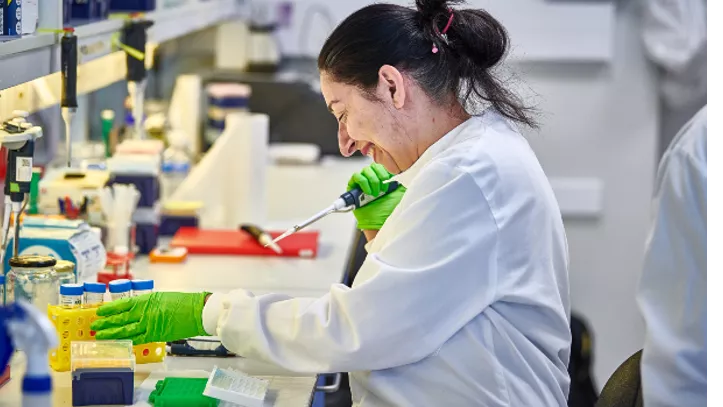
Diabetes UK and the National Institute for Health and Care Research (NIHR) have launched a new strategy to set the direction of clinical and applied diabetes research in the UK. Its aim is to improve care and speed up progress towards new treatments for people with or at risk of diabetes.
Research has revolutionised diabetes care. Nowadays, people with diabetes have access to a range of medications, technologies and support to help them with the taxing day-to-day management of their condition and to avoid long-term complications.
But still each week hundreds of people with diabetes die prematurely and thousands are diagnosed with life-changing complications that could have been prevented. Increased investment into diabetes research is needed to help people with or at risk of diabetes live better and longer lives.
To stimulate additional investment into research areas with the greatest need, Diabetes UK and the NIHR have launched the UK Strategy for Clinical and Applied Diabetes Research.
Roadmap for researchers
The strategy sets our six key research areas where increased activity would help to address unmet need. These areas were identified by gathering information on diabetes research funding in the UK during 2014-2019.
Groups of researchers, healthcare professionals and people with diabetes analysed the findings and made recommendations about where there are opportunities to accelerate clinical and applied research to benefit people with or at risk of diabetes sooner.
Their recommendations were then mapped against the research priorities gathered through James Lind Alliance Priority Setting partnerships and the work of the Diabetes Research Steering Groups to make sure that they reflected the views of people with or at risk of diabetes.
The six key research areas identified are:
-
Prevention of type 2 diabetes and obesity
-
Gestational diabetes
-
Multiple long-term conditions in people with diabetes
-
Moving research findings into practice
-
Addressing health inequalities in diabetes
-
Supporting future diabetes research leaders and fostering expert skills
Recommendations in these areas are wide-ranging. We hope these will help the UK diabetes research community collaborate in areas with the most need and greatest promise, so that people with or at risk of diabetes can benefit from improved care and new treatments as soon as possible.
From recommendations to research
Diabetes UK and the NIHR are committed to working with the research community to drive forward the recommendations from the strategy. We have already launched new joint funding calls for research into areas identified as priorities in the strategy:
-
Diabetes distress
-
Diabetes and mental health services
-
Care for older people with diabetes.
Anna Morris, Assistant Director of Research at Diabetes UK, says:
“We are delighted to publish this strategy developed in partnership with the NIHR. It highlights the transformational difference clinical and applied research has already made to diabetes care and shines a light on areas in need of increased activity, along with Diabetes UK’s and the NIHR’s commitment to work together to address this unmet need.
“The strategy highlights areas where the stark under investment is in contrast with the scale and impact of the challenge, such as the prevention of type 2 diabetes and understanding, preventing and managing gestational diabetes. We hope that the community of researchers and funders take up the challenge to drive forward progress in these areas.”
Professor Lucy Chappell, Chief Executive of the NIHR, says:
“This strategy highlights a range of great examples of where research has been translated into improvements in outcomes for people with diabetes, and the factors that have enabled this success.
“But it also shows where more work is needed, such as addressing those where diabetes exists alongside other long-term conditions, improving management of diabetes in pregnancy, tackling health inequalities and supporting the next generation of researchers.
“We look forward to building on our partnership with Diabetes UK and other funders, working with the research community to address the challenges facing people with and at risk of diabetes.”
Dr Goher Ayman and Rohit Patel, who both live with diabetes and are members of the strategy steering group, said:
“The collaborative approach, bringing together the views of people with diabetes, healthcare professionals and researchers, has resulted in wide-ranging recommendations. On a number of levels, these recommendations commit to facing the challenge of ensuring inclusive, relevant and impactful research.
“We welcome the much-needed focus on addressing the quickly-growing health inequalities and access to life-changing care options. We also welcome the much-needed acknowledgement that research must reflect the complexity of diabetes in the real-world, across the whole life course, and that this often includes other conditions.
“We call on researchers and research funders to take up the challenge to drive forward investment in these critical areas.”
